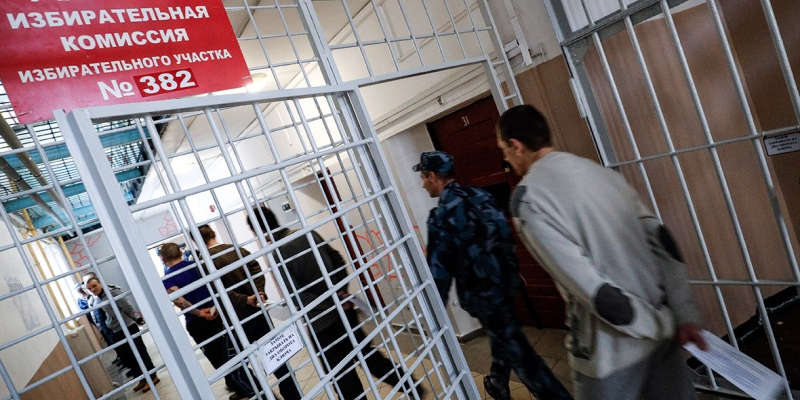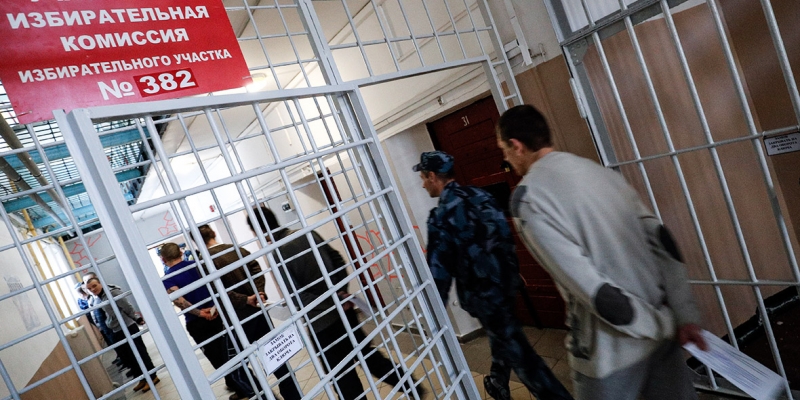Andmore than 100 thousand citizens who are in places of forced detention have the right to vote. 300 polling stations will be organized for them, the observers will be members of the PMC

About 100 thousand people who are in places of forced detention have the right to vote in the State Duma elections in September. This was told by the first deputy head of the Department of educational, social and psychological work of the Federal Penitentiary Service Vyacheslav Tretyakov at a meeting of the Public Chamber.
“At the moment, there are about 100 thousand people who will participate in the elections, and to whom the Federal Penitentiary Service will be obliged to provide the opportunity to exercise the right to vote,” he noted.
According to Tretyakov, 79,978 people who have the right to vote are currently in jail: by September, the figure may change, so we are talking “approximately” about 80 thousand people, he added. In relation to another 7.5 thousand people, a preventive measure was chosen in the form of house arrest, 3.7 thousand persons under investigation are banned from certain actions, 58 people are on bail.
People who have been sentenced to restriction of freedom also have the right to vote in elections: according to the Federal Penitentiary Service, this is more than 37 thousand people. They, together with those who have been chosen a measure in the form of a ban on certain actions or a pledge, can vote at the polling stations at the place of registration, Tretyakov said. It is expected that about 15 thousand people will cast their votes in correctional centers where they are serving sentences for forced labor.
The Federal Penitentiary Service will provide voting from September 17 to 19, but in small pre-trial detention centers, the administration will not artificially delay this time for three days. “If the isolators are large, for example, “Crosses”in St. Petersburg, then, accordingly, everyone there will not have time to vote physically during the day (in compliance with epidemiological requirements. & mdash;RBC), and within three days it is real, ” Tretyakov said at the meeting.
It is planned to organize 300 polling stations for the voting of suspects and accused, more than half of which will be formed directly in the institutions of the penal enforcement system, Tretyakov said at the meeting. At the presidential elections in 2018, there were 350 such polling stations, 148 of them were located on the territories of the pre-trial detention center; at the all-Russian vote on the Constitution, there were 303, 135 polling stations directly in the institutions of the Federal Penitentiary Service.
Members of the PMC will be able to work as observers of the voting process in places of forced detention, said Maxim Grigoriev, chairman of the coordinating Council for public monitoring of voting at the Public Chamber. According to him, they will be given a special observer status.
Usually, voting takes place in the conference rooms of the pre-trial detention center, Eva Merkacheva, a member of the Moscow PMC, told RBC. According to her, the observation at the polling stations in the institutions of the Federal Penitentiary Service does not differ much from ordinary polling stations, the exception is that citizens are brought from the cells to vote one by one. The potential problem of voting in a pre-trial detention center is related tothe turnout and the possibility of forcing the accused to vote, Merkacheva noted. “There were moments, not in the past, not in the elections before last, when they went into the cameras and said:” I have to vote, and that’s it.” And if you don’t, then sanctions will begin, they won’t take you out for a walk, and so on. It is a right to vote, but not an obligation, ” she noted.
Observers from political parties are allowed in the pre-trial detention center, often the FSIN also invites journalists to cover the vote, said Georgy Ivanov, a member of the Moscow PMC. He added that a significant number of foreign citizens are being held in Moscow pre-trial detention centers, so not all prisoners under arrest take part in the votingthe guard. Ivanov added that the voting can take place in parallel in several buildings of the pre-trial detention center, so it is important in this case to provide all the ballot boxes with observers or journalists. “In general, I think, taking into account the admission of observers and the media, the possibilities for falsifications are not much higher than at a regular election site,” he said.
In the presidential elections in 2018, more than 75 thousand people voted in places of forced detention. As of January 31, 2020, 519.6 thousand people were in Russian places of detention.
In September, elections to the State Duma of the eighth convocation will be held. A total of 450 deputies will be elected, of which 225 will be elected on party lists, and another 225 will be elected in single-mandate districts. In seven Russian regions, voting in the September elections will be held online. Residents of Moscow, Sevastopol, Kursk, Murmansk, Nizhny Novgorod, Rostov and Yaroslavl regions will be able to vote remotely. At the same time, elections to the regional parliament will be held in 39 regions of the Russian Federation, and residents will choose governors in 11 regions.
RBC on YouTube Live broadcasts, videos and recordings of broadcasts on our YouTube channel

